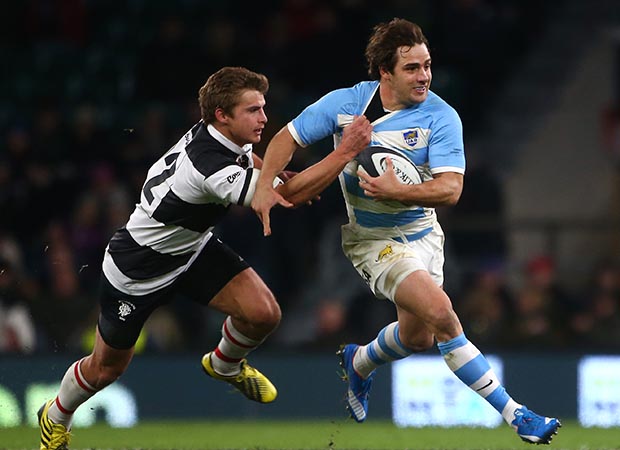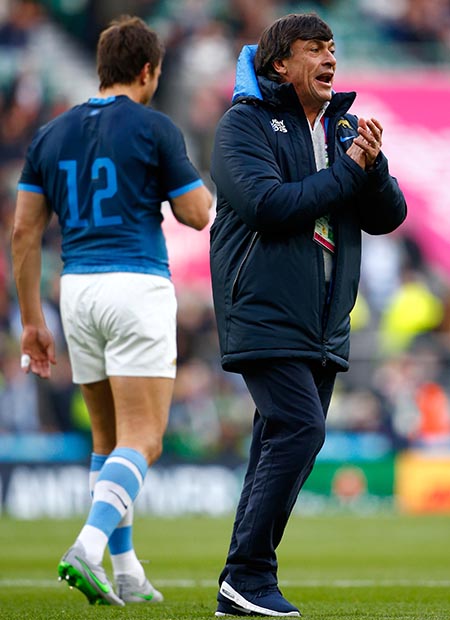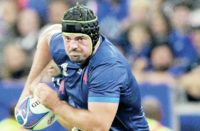 Argentine rugby is a strange beast. It is one with a habit of never quite being what we expect, and it's a characteristic symbolised by their nickname, the Pumas, being at odds with the spotted jaguar emblem on their national jersey.
Argentine rugby is a strange beast. It is one with a habit of never quite being what we expect, and it's a characteristic symbolised by their nickname, the Pumas, being at odds with the spotted jaguar emblem on their national jersey.
That little mix-up occurred in 1965 when a South African journalist, who knew the vast South American country was home to both big cats, picked the wrong one when he was on a deadline and under pressure to come up with a nickname for the Argentine tourists.
It stuck, and half a century later Argentina are still just as hard to pigeon-hole. Since Daniel Hourcade picked up the baton as coach in 2013 Argentina have re-emerged as a progressive international force, not only finishing fourth in the 2015 World Cup, but with a new generation of Pumas thrilling their own fans and winning a legion of outside admirers with their cut-and-thrust approach.
Lethal finishers like Juan Imhoff and the maze-runner, Santiago Cordero, lit up the World Cup stage in a way that the hosts, England, were unable to – and in the process put the doldrum years under Hourcade's predecessor, Santiago Phelan, out of sight, and mind.
Phelan presided over an uninspired five year block in which Argentina regressed from the high achieved at the 2007 World Cup – where, under the tutelage of coach Marcelo Loffreda, they took the tournament by storm to finish third – to a low of winning only 13 of 45 Tests.
Since he took over, Hourcade, known as “El Huevo”(The Egg) – apparently because his brother thought his head looked like one when he was a kid – has succeeded in reconnecting the Pumas with the legacy left by the 2007 trailblazers.
After decades of being a punishing side renowned for scrummaging power and bruising forward play, with the Pampas bulls steered into applying territorial pressure through great kickers like Hugo Porta, they underwent a transformation to a team that could play total rugby.
With Porta's former team-mate Loffreda as the main strategist, and scrum-half Agustin Pichot as his on-field general, in 2007 Argentina played a brand of rugby which combined forward power with sparkling back play, and was as effective as it was entertaining.
 Hourcade, right, has been reading from the same script, and the coach has brought vision as well as expertise to the role. The other important element about Hourcade, below, who hails from the northern city of Tucuman – and is widely travelled, including as Portugal's assistant coach at the 2007 World Cup – is that he has the courage of his convictions, and has moulded a team with similar characteristics.
Hourcade, right, has been reading from the same script, and the coach has brought vision as well as expertise to the role. The other important element about Hourcade, below, who hails from the northern city of Tucuman – and is widely travelled, including as Portugal's assistant coach at the 2007 World Cup – is that he has the courage of his convictions, and has moulded a team with similar characteristics.
It is barely over a year ago that Argentina played blistering attacking rugby to progress to the last four of the World Cup for the second time after overwhelming Ireland 43-20. More than anything, it is that willingness to ‘have a go' which will make Argentina a dangerous proposition for England when the teams face each other at Twickenham on Saturday.
With two dynamic scrum-halves in Martin Landajo and Tomas Cubelli, and adventurous spirits in fly-half Nicolas Sanchez and full-back Joaquin Tuculet, Argentina have playmakers with the ability to think on their feet rather than to be bound by the playbook.
Add to that luminaries like veteran centre Juan Martin Hernandez – dubbed “El Mago”(The Magician), Hernandez was at the heart of the 2007 surge, and last year played in his third World Cup – and Argentina have what it takes to launch lacerating counter-attacks from deep.
With dynamic backrowers like Pablo Matera and Facundo Isa they also have the requisite combination of agility and power to stab through the middle, especially the capacity to make headway at the ruck when opponents do not commit enough players to the contest for the ball, or to defend that area.
New Zealand came very close to discovering this to their cost in their Rugby Championship game against Argentina in Hamilton two months ago when the visitors continuously exploited the chink in their armour. The upshot was that the Pumas were within two points of the All Blacks at 24-22 with only 27 minutes remaining.
A series of sweeping attacks by Argentina should have yielded more points, but when it did not New Zealand came off the ropes to deliver a series of devastating counter-punches which resulted in a misleading 57-22 final scoreline.
It can be argued that the growing pains that Argentina experienced during the 2016 Rugby Championship – in which they finished last, with their only victory coming at home against South Africa – were self-inflicted. This is because since the World Cup both Hourcade and Pichot, who is now the vice-chairman of World Rugby and a member of the Argentine Rugby Union board, have backed the sea-change policy to exclude European-based players from the national team.
As Hourcade put it recently: “It is a political decision, but we support it.” Their view is that the short-term pain of leaving out established European-based Pumas stars like Imhoff, Marcos Ayerza, Marcelo Bosch, Juan Figallo, Mariano Galarza, Manuel Carriza, Juan Fernandez Lobbe, Santiago Fernandez and Juan Socino, both for this autumn series and the Rugby Championship before it, will bring long-term gain.
With Argentina included in last season's Super 18 for the first time through the new Buenos Aires-based Jaguares franchise, Hourcade has taken the same view as England and New Zealand that a player can only represent Argentina if based at home. This has also involved the bold move of backing youth by fast-tracking players straight from the Argentina U20s into the senior squad, with wing Cordero, No.8 Isa and lock Guido Petti joined by hooker Julian Montoya and centre/wing Matias Moroni.
While no team can easily absorb the loss of the experience and talent in the cohort of Pumas playing for European clubs, the blend of these potent youngsters with old hands like captain Agustin Creevy, Hernandez, Landajo, Sanchez and company suggests that Argentina are a more potent force than the outfit that struggled to get its attack going against Wales last weekend.
That 24-20 reverse is unlikely to have blunted the claws of the Argentine big cat, and irrespective of results against Wales and Scotland, Hourcade's Pumas will be on the prowl against England. They will also be confident that they are capable of bringing down the biggest prey, because they've done it before.


























